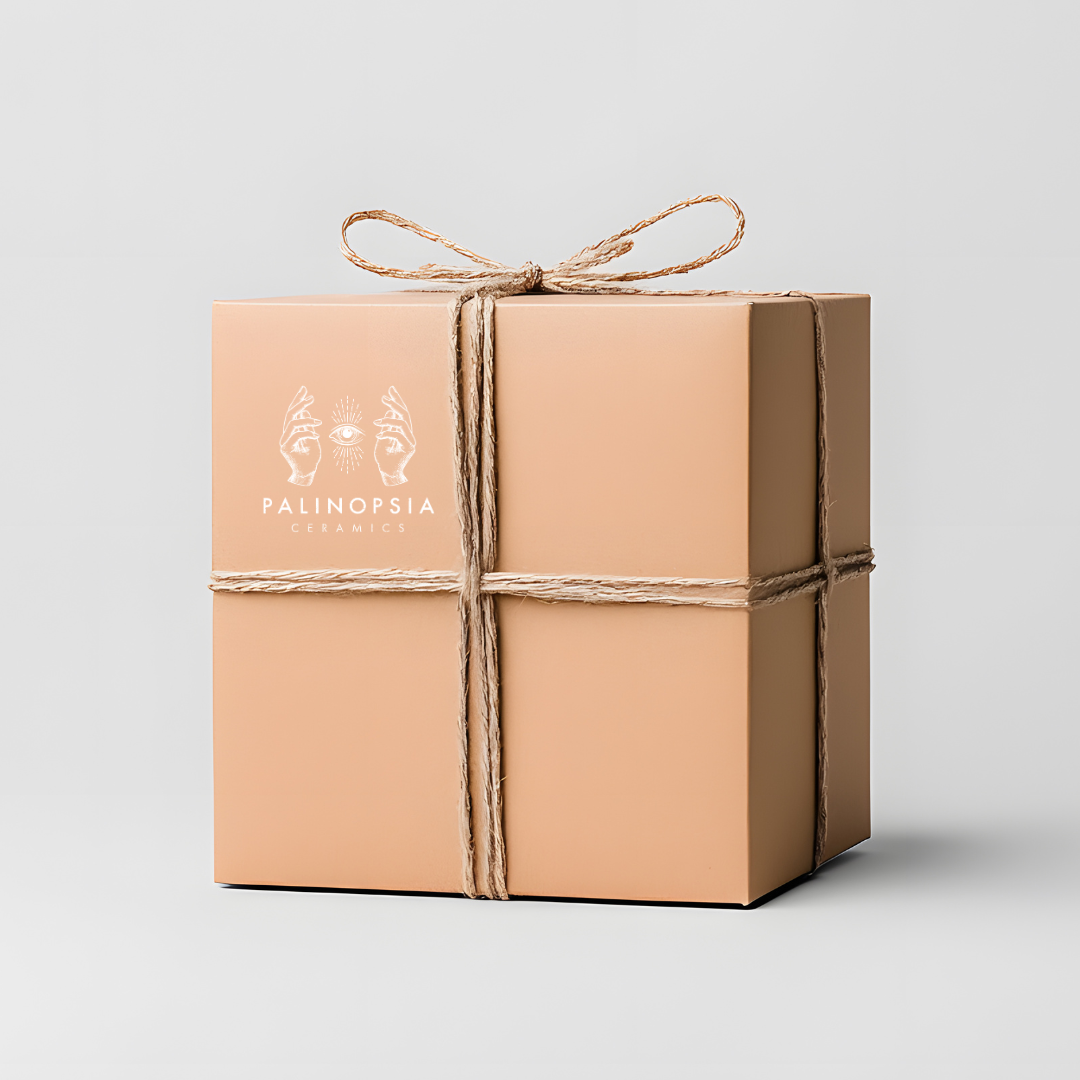Clay Chronicles: From Mud to Magic, the Journey of Handmade Ceramic Dinner Sets

Get ready to dive into the messy and fascinating world of shaping clay, where we take you behind the scenes and explore the intricate process behind creating Palinopsia’s handmade ceramic dinner sets. In this journal, we'll delve into the craftsmanship, techniques, and dedication that go into producing each unique piece.
The Foundation: The Quest for Perfect Muck
At the heart of every handmade ceramic dinner set lies the choice of clay. It’s an endless quest to find the finest mud, that magical muck with just the right texture, plasticity, and fireproof superpowers. Our team of clay connoisseurs sniffs, squishes, and tests countless mud samples until we uncover the perfect clay worthy of transforming into splendid dinner sets. This foundation ensures the durability, functionality, and aesthetic appeal of our dinner sets. We consider many factors; the speckles, the colour, the minerals, the flexibility and density to name just a few. Finding the right balance makes stoneware clay a formidable force in the world of ceramics, it's the superhero that brings strength, durability, and longevity to your beloved stoneware dinner sets.
Shaping by Hand: Moulding Each Piece with Precision
One of the distinguishing features of handmade ceramics is the meticulous hand-shaping process. Our merry band of artisans takes centre stage, armed with their trusty hands and an arsenal of unconventional tools. With a flick of the wrist and a dash of wizardry, they shape the clay into plates, bowls, cups, and mugs. It's like a magical dance routine, except instead of music, we have the satisfying squelch of clay. Handmade means that each piece is individually crafted with precision and attention to detail.

Behind each captivating addition to our collection lies the culmination of countless weeks dedicated to producing samples. We tirelessly strive to ensure that every piece fits together seamlessly, forming a harmonious ensemble where each shape complements and enhances the other.
Wheel Wonders: Spinning for Symmetry and Balance
For certain pieces, like plates, bowls and cups, we employ the age-old technique of throwing on the potter's wheel, but in order to optimise time and results we turn to our twirling friends; Jolly and Jigger. This method allows us to achieve symmetry, balance, and a consistent thickness in the walls of each vessel. This version of a potter's wheel brings a touch of elegance and refinement to our dinner sets while ensuring consistency. It's a balancing act of epic proportions, where we channel our inner tightrope walkers to achieve the perfect thickness and balance. All wheels add a touch of handmade magic to ceramics and pottery, and wheel-thrown pieces are easily recognisable by the distinct spiralling signature they leave behind.


Liquid Clay: The Art of Casting
Slip casting is a remarkable technique in the world of ceramics, and commonly used for delicate vases to intricate shapes. This process involves pouring liquid clay, known as slip, into meticulously crafted plaster moulds. As the mould absorbs the moisture from the slip, a thin layer of solid clay forms, taking the precise shape of the mould. This method allows for the production of intricate and consistent ceramic pieces with remarkable detail and complexity. Slip casting is like a dance between fluidity and transformation, turning humble clay into extraordinary works of art.


Mastering the Trim: A Tightrope With Knives
Once a ceramic piece has dried to a certain stage, skilled ceramists use specialised tools, such as trimming knives or chisels, to carefully shape and refine its form. With expert hands and keen eyes, they remove excess clay, smooth rough edges, and create clean lines, enhancing the overall aesthetics and functionality of the piece. Hand trimming allows for subtle adjustments and personalisation, ensuring that each ceramic creation is unique and meets the artist's vision. It is through this artful process that the true beauty of handmade ceramics emerges, showcasing the attention to detail and craftsmanship that sets them apart.

Bisque Firing: Nothing to do with shellfish or soup
Once our handcrafted clay creations have been shaped and dried, they embark on a transformative journey known as bisque firing. In this crucial step, we carefully tuck the clay pieces into the cozy kiln and let the heat work its magic. This first firing is done low and slow, around 900 to 1000 degrees Celsius (1650 to 1830 degrees Fahrenheit). As the temperature rises, any lingering moisture bids its farewell, leaving behind a solid and resilient ceramic base. Bisque firing is like the calm before the glazing storm – it sets the stage for the next act, where our dinner sets get hand painted with vibrant colours and funky patterns.

The Art of Glazing: Picasso Meets Jackson Pollock
Once the ceramic pieces are formed, we move on to the glazing process, where things get colourful, messy, and artsy. Glazes not only add vibrant colours and captivating textures to our dinner sets but also serve as a protective layer. Our ceramists, armed with brushes and buckets of vibrant glazes, unleash their inner Picasso-meets-Jackson-Pollock. They paint, they splatter, they swirl those glazes onto the ceramic canvas, creating funky patterns and textures that make each piece truly unique. Its balance of flow and skill, the glazing process requires expertise and precision to achieve the desired outcome.


Fiery Finale: What Happens in The Kiln Stays in The Kiln
To complete the transformation from clay to ceramic, our brave dinner sets venture into the fiery depths of the kiln, a place where clay meets it's destiny. In this crucial final step; the kiln fires up to scorching temperatures, turning clay into rock-solid ceramic superheroes. This process involves carefully placing the glazed pieces in a kiln and subjecting them to high temperatures for over 12 hours. The intense heat turns the clay into a durable, long-lasting material, ensuring the dinner sets can withstand the rigours of daily use.


The production of handmade ceramic dinner sets is a labor of love, requiring skill, patience, and dedication. From the quest for the perfect clay to the wild dance of the potter's wheel, and the magical touch of glazes and brushstrokes, each piece carries the spirit of the artisans who poured their hearts into its creation. We invite you to embrace the magic and discover the joy of dining with our extraordinary handmade ceramic dinner sets and experience the magic firsthand.








